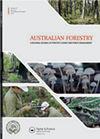Current and future risks of drought-induced mortality in Pinus radiata plantations in New South Wales, Australia
IF 0.9
4区 农林科学
Q3 FORESTRY
引用次数: 2
Abstract
ABSTRACT Drought is a regular feature of Australian landscapes, and its intensity and frequency are likely to increase in a changing climate. Land managers are grappling with managing the impacts of drought, with large-scale die-offs occurring more frequently in forests globally. Drought-induced tree mortality has caused major impacts in Pinus radiata plantations in New South Wales, Australia, with extended drought, heatwaves and pest and disease attacks all recognised as predisposing, inciting or contributing factors. The extent and severity of drought-induced tree mortality has been mapped across the Pinus plantation estate in New South Wales annually since 1996. In this study, we used this long-term empirical data to develop a model of drought risk for P. radiata plantations. Using random forest, we identified site index, annual temperature, annual rainfall, elevation and increasing number of hot days (above 20°C and 35°C) as the influencing variables associated with drought-induced tree mortality. We then used this model to look at the risk of drought-induced tree mortality under climate-change scenarios in 2050 and 2070. Although forest managers already understand the drought risk in their estates, we developed an empirical model and produced GIS layers at high resolution (100 m) to assist in more accurately and effectively managing drought. The accuracy and precision of our model (overall accuracy 89.2%, kappa 0.75) enables forest managers to include it in their decision-making in the management of the potential impacts of drought on the current plantation estate (e.g. via modified silvicultural regimes) as well as in the future (e.g. modified silvicultural regimes or planting drought-tolerant genotypes).澳大利亚新南威尔士州辐射松人工林干旱致死的当前和未来风险
摘要干旱是澳大利亚景观的一个常见特征,随着气候变化,干旱的强度和频率可能会增加。土地管理者正在努力应对干旱的影响,全球森林中大规模死亡的频率更高。干旱导致的树木死亡对澳大利亚新南威尔士州的辐射松种植园造成了重大影响,长期干旱、热浪和病虫害袭击都被认为是诱发、煽动或促成因素。自1996年以来,每年都会绘制新南威尔士州松树种植园干旱导致树木死亡的程度和严重程度地图。在这项研究中,我们使用这些长期经验数据来开发辐射P.radiata种植园的干旱风险模型。利用随机森林,我们确定了场地指数、年温度、年降雨量、海拔和高温天数的增加(20°C和35°C以上)是与干旱引起的树木死亡率相关的影响变量。然后,我们使用这个模型来研究2050年和2070年气候变化情景下干旱导致树木死亡的风险。尽管森林管理者已经了解他们庄园的干旱风险,但我们开发了一个经验模型,并制作了高分辨率(100米)的GIS层,以帮助更准确有效地管理干旱。我们的模型的准确性和精确性(总体准确率89.2%,kappa 0.75)使森林管理者能够将其纳入干旱对当前种植园的潜在影响的管理决策中(例如,通过改良的造林制度)以及未来(例如,改良的造林制度或种植耐旱基因型)。
本文章由计算机程序翻译,如有差异,请以英文原文为准。
求助全文
约1分钟内获得全文
求助全文
来源期刊

Australian Forestry
FORESTRY-
CiteScore
3.70
自引率
4.80%
发文量
15
审稿时长
>12 weeks
期刊介绍:
Australian Forestry is published by Taylor & Francis for the Institute of Foresters of Australia (IFA) for scientific, technical, and professional communication relating to forestry in the Asia Pacific.
 求助内容:
求助内容: 应助结果提醒方式:
应助结果提醒方式:


